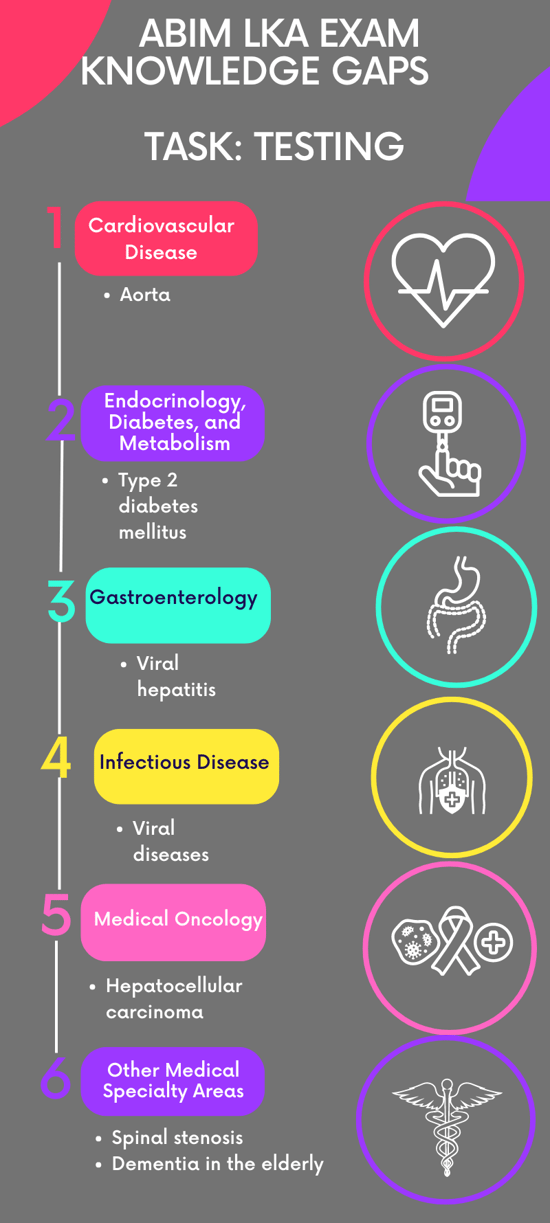The American Board of Internal Medicine (ABIM) Longitudinal Knowledge Assessment (LKA) offers a continuous, ongoing evaluation of physicians' knowledge across a wide range of topics in internal medicine. While the LKA provides an opportunity to continuously learn and assess knowledge, some content areas prove to be particularly challenging for many general internists. These areas are referred to as Knowledge Gaps. In this article, we explore why certain topics are commonly missed and provide strategies to help improve performance in these areas.
Most Common ABIM LKA Knowledge Gaps by Task
The most frequently missed items on the ABIM LKA often fall into three categories: treatment/care decisions, testing, and diagnosis.
Treatment/Care Decisions
Treatment/care decisions refer to the selection of appropriate therapeutic interventions or management strategies for a patient's condition.
.png?width=550&height=1375&name=LKA%20GAP%20TREATMENT%20%20final%20(1).png)
Testing
Testing refers to the process of selecting and performing appropriate diagnostic tests to confirm or rule out a medical condition.

Diagnosis
Diagnosis refers to the process of identifying a disease or condition based on its signs, symptoms, and available test results.

Understanding why these areas are difficult is crucial to developing an effective strategy to improve. These topics are often rapidly evolving, highly specialized, or involve complex decision-making that can be counterintuitive for general internists.
Why Are These Topics Frequently Missed?
- Frequent Updates to Guidelines: Guidelines for conditions like hypertension and osteoporosis are updated frequently, leading to confusion among physicians who do not regularly keep up with the latest changes. For example, the evolving thresholds for initiating antihypertensive treatment can be challenging to track.
- Complexity and Subspecialization: Conditions such as aortic vascular disease or hepatocellular carcinoma often require specialized knowledge beyond the scope of general internal medicine. Topics like these are more familiar to subspecialists, making them a challenge for generalists.
- Ambiguity in Presentations: Conditions like acute kidney injury have multiple possible causes, and differentiating between these can be difficult in an exam setting where limited context is provided. The same applies to nerve root syndromes, where multiple overlapping symptoms can make accurate diagnosis challenging.
- Overlap with Subspecialty Knowledge: Some topics, like nerve root syndromes or metabolic acidosis, often cross over into subspecialty areas such as neurology or nephrology, which general internists may not manage frequently.
- Nuances in Preventive Care: Topics such as asymptomatic bacteriuria require careful decision-making between treatment and observation. These types of cases often lead to confusion, as the inclination may be to overtreat, leading to errors.
Strategies to Improve Performance
To address these gaps, here are several strategies that physicians can employ to boost their LKA performance:
1. Focused Review on Knowledge Gaps
One of the most effective ways to improve is to target the specific areas where weaknesses exist. Physicians can use the ABIM blueprint or specialized question banks, such as Med-Challenger, to prioritize study areas. For example, emphasizing hypertension management or osteoporosis treatment can help close the gaps that are most frequently identified.
2. Leverage Real-Time Feedback
The LKA provides immediate feedback for each question, which includes the correct answer, the rationale, and references for further reading. This feature is highly beneficial for identifying and addressing knowledge gaps. Physicians can use this feedback to strengthen their understanding of weak areas and prevent similar mistakes in the future.
3. Practice Case-Based Learning
Case-based learning, which Med-Challenger provides, allows physicians to apply knowledge in real-world scenarios, which helps solidify understanding. This approach is particularly helpful in dealing with conditions like acute kidney injury and generalized anxiety disorder, where clinical context matters. Interactive simulations or detailed case reviews can provide the necessary practice to improve decision-making skills.
4. Keep Updated with Guidelines
Given the frequent updates in treatment guidelines, subscribing to updates from key medical bodies is crucial. Organizations like the American Diabetes Association or the American College of Cardiology frequently update their guidelines, and staying informed is key to providing evidence-based care.
5. Subspecialty Refresher Courses
Taking refresher courses in subspecialty areas such as nephrology or infectious disease can build confidence in topics that generalists may not manage regularly.
6. Adaptive Learning Platforms
Adaptive learning platforms, such as Med-Challenger, that focus on personalized learning can help physicians target their weaknesses effectively. By presenting more questions in weak areas until mastery is demonstrated, these platforms provide an efficient way to reinforce learning over time.
Improving performance on the ABIM LKA requires a deliberate focus on addressing knowledge gaps, leveraging immediate feedback, staying updated with guidelines, and engaging in targeted practice. By utilizing a combination of focused review, subspecialty courses, and adaptive learning tools, general internists can improve their performance in challenging areas and gain confidence in managing a wide variety of conditions.
The LKA is more than just an assessment—it is a continuous learning tool that can help physicians stay current and refine their skills. Embrace the opportunity to learn from each question and take the steps necessary to elevate your practice.
No matter your program, no matter the size, Med-Challenger for Groups and Institutions can better prepare your program or group, fulfill industry requirements, and increase test scores.
For personal medical education that includes board's prep, MOC, and CME requirements, Med-Challenger has you covered in Family Medicine, Emergency Medicine, Internal Medicine, Pediatrics, Pediatric Emergency Medicine, OBGYN, Physician Assistants, and Nurse Practitioners.